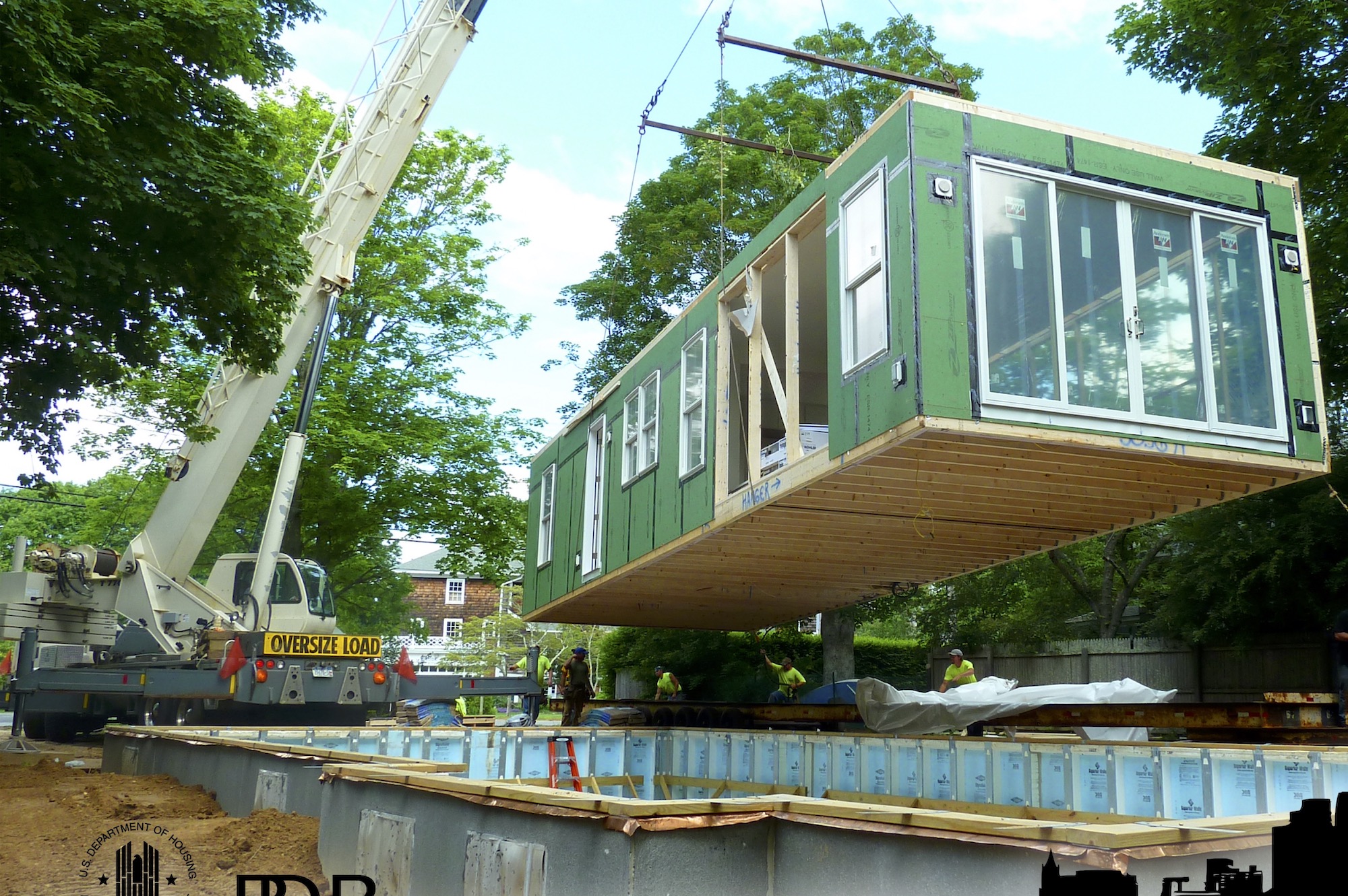The U.S. Department of Housing and Urban Development, in partnership with the National Institute of Building Sciences and MOD X, has released the Offsite Construction for Housing: Research Roadmap, a strategic report that presents the key knowledge gaps and research needs to overcome the barriers and challenges to offsite construction.
High prices for buyers and renters are forcing Americans out of their homes and making housing unattainable. This crisis is to a large extent driven by supply constraints.
Offsite construction has the potential to deliver more affordable and accessible single and multifamily housing at scale. However, offsite construction for housing in the U.S. faces several challenges to increase uptake and adoption. This stands in considerable contrast to more mature international offsite construction industries, such as those in the UK, Japan, and Sweden.
“We need an all-of-the-above approach to housing, and offsite construction represents a unique and underused opportunity to help meet the needs of America’s working families,” said AC Powell, JD, CPS, President and CEO of NIBS. “We applaud HUD for undertaking this research effort to overcome barriers and level the playing field for all construction methods to help alleviate the housing crisis.”
What’s in The Offsite Construction for Housing: Research Roadmap
The Research Roadmap was developed by a Project Technical Committee chaired by MOD X and composed of national and international stakeholders and cross-sector experts. It is intended as a roadmap for HUD to align its programs and partnerships, while simultaneously offering an industry-wide roadmap for governments, universities, and offsite companies to come together to advance offsite construction for housing.
The Research Roadmap covers six topical areas in need of coordinated research efforts, with sub-topics and specific research questions listed to help answer the knowledge gaps:
- Research Topic 1: Regulatory and Policy Framework.
- Research Topic 2: Standards and System Performance.
- Research Topic 3: Capital, Finance, and Insurance.
- Research Topic 4: Project Delivery and Contracts.
- Research Topic 5: Labor and Workforce Training and Management.
- Research Topic 6: Business Models and Economic Performance.
The NIBS Off-Site Construction Council
In 2013, the National Institute of Building Sciences established the Off-Site Construction Council (OSCC) to serve as a research, education, and outreach center for relevant and current information on off-site design and construction for commercial, institutional, and multifamily facilities. NIBS staff and members of the OSCC have supported federal and private off-site construction research projects, including toolkits, roadmaps, and reports for the off-site industry. NIBS and the OSCC encourage OSCC members and other off-site stakeholders to submit reports or projects of interest that can help in the furthering of the council's goals. For more information, visit the OSCC.
About NIBS
National Institute of Building Sciences brings together labor and consumer interests, government representatives, regulatory agencies, and members of the building industry to identify and resolve problems and potential issues in the built environment. NIBS is a nonprofit, non-governmental organization. It was established by Congress in 1974. For more information, visit nibs.org or follow @bldgsciences on Twitter and Facebook.
Related Stories
Urban Planning | Jun 15, 2023
Arizona limits housing projects in Phoenix area over groundwater supply concerns
Arizona will no longer grant certifications for new residential developments in Phoenix, it’s largest city, due to concerns over groundwater supply. The announcement indicates that the Phoenix area, currently the nation’s fastest-growing region in terms of population growth, will not be able to sustain its rapid growth because of limited freshwater resources.
Multifamily Housing | Jun 15, 2023
Alliance of Pittsburgh building owners slashes carbon emissions by 45%
The Pittsburgh 2030 District, an alliance of property owners in the Pittsburgh area, says that it has reduced carbon emissions by 44.8% below baseline. Begun in 2012 under the guidance of the Green Building Alliance (GBA), the Pittsburgh 2030 District encompasses more than 86 million sf of space within 556 buildings.
Industry Research | Jun 15, 2023
Exurbs and emerging suburbs having fastest population growth, says Cushman & Wakefield
Recently released county and metro-level population growth data by the U.S. Census Bureau shows that the fastest growing areas are found in exurbs and emerging suburbs.
Engineers | Jun 14, 2023
The high cost of low maintenance
Walter P Moore’s Javier Balma, PhD, PE, SE, and Webb Wright, PE, identify the primary causes of engineering failures, define proactive versus reactive maintenance, recognize the reasons for deferred maintenance, and identify the financial and safety risks related to deferred maintenance.
Mixed-Use | Jun 12, 2023
Goettsch Partners completes its largest China project to date: a mixed-used, five-tower complex
Chicago-based global architecture firm Goettsch Partners (GP) recently announced the completion of its largest project in China to date: the China Resources Qianhai Center, a mixed-use complex in the Qianhai district of Shenzhen. Developed by CR Land, the project includes five towers totaling almost 472,000 square meters (4.6 million sf).
Mixed-Use | Jun 6, 2023
Public-private partnerships crucial to central business district revitalization
Central Business Districts are under pressure to keep themselves relevant as they face competition from new, vibrant mixed-use neighborhoods emerging across the world’s largest cities.
Multifamily Housing | Jun 6, 2023
Minnesota expected to adopt building code that would cut energy use by 80%
Minnesota Gov. Tim Walz is expected to soon sign a bill that would change the state’s commercial building code so that new structures would use 80% less energy when compared to a 2004 baseline standard. The legislation aims for full implementation of the new code by 2036.
Student Housing | Jun 5, 2023
The power of student engagement: How on-campus student housing can increase enrollment
Studies have confirmed that students are more likely to graduate when they live on campus, particularly when the on-campus experience encourages student learning and engagement, writes Design Collaborative's Nathan Woods, AIA.
Multifamily Housing | Jun 1, 2023
Income-based electric bills spark debate on whether they would harm or hurt EV and heat pump adoption
Starting in 2024, the electric bills of most Californians could be based not only on how much power they use, but also on how much money they make. Those who have higher incomes would pay more; those with lower incomes would see their electric bills decline - a concept known as income-based electric bills.
Multifamily Housing | May 30, 2023
Boston’s new stretch code requires new multifamily structures to meet Passive House building requirements
Phius certifications are expected to become more common as states and cities boost green building standards. The City of Boston recently adopted Massachusetts’s so-called opt-in building code, a set of sustainability standards that goes beyond the standard state code.

















